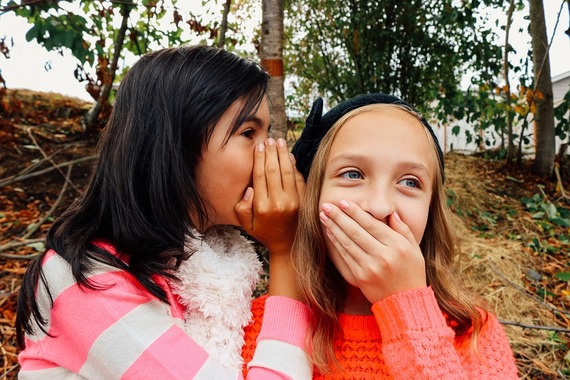Why, you may have asked yourself recently, would your young daughter want a t-shirt that prominently displays the words "SQUAD GOALS" in bold, glittery font? Why are all social media feeds constantly clogged with glowing images of Taylor Swift surrounded by her "squad," a gaggle of perfect-looking model and movie star "besties"? According to Bustle, "squad goals" is "an aspirational term for what you'd like your group of friends to be or accomplish." But with the recent obsession and glorification of female celebrity friendships that brought the term "squad goals" into mainstream media, we need to start questioning: where is the emphasis on strong female friendships in the movies, television shows, and books for girls and young women?
Enough with the "rom-coms" and teen dramas that cast a quirky BFF as an unimportant afterthought who only makes an appearance when the protagonist needs advice on the new guy she's dating. There's nothing wrong with girls spending time together sorting out confusing, joyful, even overwhelming feelings around crushes and romance. But there is far more to talk about, and we need more shows where besties talk to each other about family dynamics, friendship issues, ambitions, hurts, fears, and other real-life topics in their lives. We certainly need far fewer plot twists that involve girls and women ditching friends for guys, and fighting for male attention -- and by the way, where are the gay story lines?!
So what do we do?
Help your daughter explore how female friendships are portrayed in the media your daughter consumes. Would she be happy having the kind of friendships she sees being portrayed? Why or why not? Sometimes over the course of a show or film, it's difficult to keep track of everything two on-screen besties talk about. Luckily, there's an easy way for parents and daughters to sit down together and look at their favorite shows, plays, and books with a new perspective.
Try this: the Bechdel test. Coined by the cartoonist Alison Bechdel in 1985, it's a fail-safe way to decipher if a scene between two women is about something more substantive or thought-provoking than dating or romance. There are, as Bechdel wrote, "three basic requirements": 1) the scene must have at least two women present; 2) they must be talking to each other; and 3) they must be talking about something other than a man. After analyzing a scene with your girl and reaching a pass or fail conclusion, talk to her about the real-life implications of consuming media that portrays female friendships in a certain light. Ask:
What are a few other things you know about in these characters' lives they could be discussing with their best friend (besides dating or romance)?
What topics do you and your friends talk about the most?
Do you think it's bad or unfair for female friends to be portrayed as talking about dating or romance more than any other subject? Why or why not?
If you were to re-write the scene, how would you turn it into something more unique or compelling?
After a few trials with your daughter's favorite shows, check out scenes with these character duos that are sure to pass Bechdel's test and win your hearts:
- Leslie Knope and Ann Perkins from "Parks and Recreation"
- The powerhouse comedians from remake of "Ghostbusters"
- Jess Day and Cece Parekh from "New Girl"
- Rory Gilmore and Lane Kim from "Gilmore Girls"
- Tibby, Lena, Carmen, and Bridget from "The Sisterhood of the Traveling Pants"
- Mariana Foster and Callie Jacob from "The Fosters"
- Mia Thermopolis and Lily Moscovitz from "The Princess Diaries"
This essay is written by Kaitlyn Locke, an editorial intern for MEDIAGIRLS, and an undergrad studying journalism and Spanish at Boston University. She is the Features Editor of The Daily Free Press, Boston University's independent weekly student newspaper. Kaitlyn lives in Boston and spends her free time working as a barista, learning to play guitar, and buying too many leather-bound notebooks.
